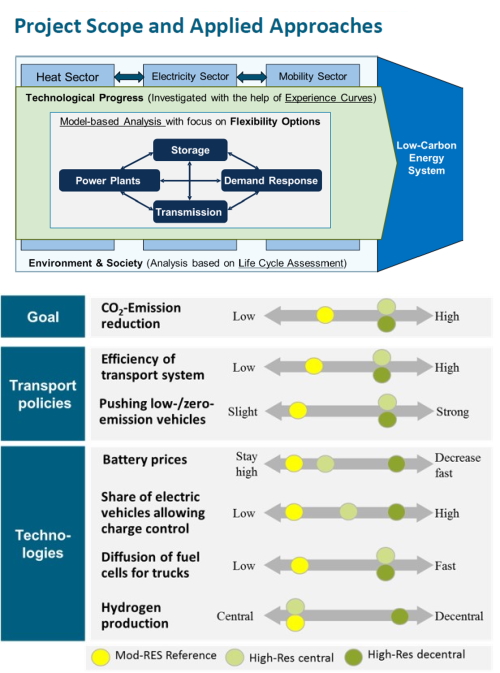
REFLEX, a project funded by the Horizon 2020 EU research program, focused on the analysis of the European Energy System under the Aspects of Flexibility and Technological Progress
 The core objective of the REFLEX project is to analyse and evaluate the development towards a low-carbon energy system with a focus on flexibility technologies in the EU to support a better system integration of Renewable Energy Sources. The project, lead by University of Dresden (Germany), identifies and assesses the most relevant low-carbon technologies and flexibility options in the mobility, heat and electricity sectors for a sustainable and cost-effective transformation of the European energy system.
The core objective of the REFLEX project is to analyse and evaluate the development towards a low-carbon energy system with a focus on flexibility technologies in the EU to support a better system integration of Renewable Energy Sources. The project, lead by University of Dresden (Germany), identifies and assesses the most relevant low-carbon technologies and flexibility options in the mobility, heat and electricity sectors for a sustainable and cost-effective transformation of the European energy system.
The analysis is based on a modelling system that considers the full extent to which current and future energy technologies and policies interfere and how they affect the environment and society while considering technological learning of low-carbon and flexibility technologies.
In the REFLEX project TRT provides expertise in the analysis of the impact of flexibility and technology options on mobility and transport.
Both diffusion of alternative technologies in the vehicle fleet and energy and transport policy measures have been considered to analyse the decarbonisation pathway in the transport sector. To this end, the ASTRA system dynamic strategic model simulates the transport system in linkage with the economy, the environment and the energy systems. It is therefore capable to represent long term impacts of transport policies not only on mobility but also on wider aspects such as economic growth or greenhouse gas emissions.
In comparison to all other energy sectors, the transport sector increased its GHG emissions since 1990. These emissions need to be reduced by 2050 by at least 60% relative to 1990. Considering the continuous growth of passenger and freight transport demand, strong and timely responses are required at the policy level. Within the REFLEX project, a reference scenario (Mod-RES) and two ambitious policy scenarios (High-RES) are simulated with the ASTRA model (under consideration of global learning for batteries through coupling with the TE3 model) and flexibility potential provided for the electricity sector. Results indicate that a bundle of complementary measures (boosting transport system energy efficiency, supporting the electrification of road transport and promoting alternative fuels )is required to support and accelerate the transition.

For more information
- Brochure
- Policy brief on Transport trends in the context of future energy scenarios
- Paper on Investigating the impact of e-bikes on modal share and greenhouse emissions with the ASTRA model.
- Detailed techno-economic assessment of low-carbon technologies focusing on flexibility options and applying bottom-up sectoral models and demand projection models of the heat, electricity and transport sector, download deliverable.
- Application of social environmental life cycle assessment (eLCA and sLCA) to analyse and compare environmental impacts, social risks and external costs due to life cycle-based environmental impacts related to the European energy systems for the three envisaged REFLEX scenarios, download deliverable.
- Document providing a short but concise overview of the main findings for the different sectors and a bundle of policy recommendations derived thereof.
- The book “The Future European Energy System – Renewable Energy, Flexibility Options and Technological Progress” published by SpringerNature, which analyzes the transition toward a low-carbon energy system in Europe .
Projects
Project Description
CLIENT
European Commission Innovation and Networks Executive Agency (INEA)
PERIOD
dal 2016 al 2019
WEBSITE
www.reflex-project.eu
CONTACT
Francesca Fermi
fermi@trt.it

